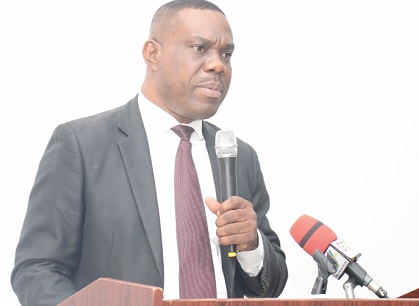
Internal auditors urged to be non-partisan
The Director-General of the Internal Audit Agency (IAA), Dr Eric Oduro Osae, has advised internal auditors of public agencies to be apolitical in the discharge of their duties.
Advertisement
He said internal auditors influenced by political considerations in the performance of their functions ceased to be professional and objective, and were likely to give defective advice to their institutions.
At a training programme for internal auditors in Accra last Tuesday, Dr Osae said internal auditors were expected to be technically competent and to ensure that the right thing was done.
“Internal auditors are supposed to survive all governments and tell them the truth of what needs to be done, irrespective of their political colour.
We are the eyes and ears of the citizens on the ground.
“Internal auditors must, therefore, act professionally, be politically neutral, and advise within the meaning of the Public Financial Management Act,” he said.
Training
The training programme, organised by the IAA in collaboration with the German Development Agency (GIZ), sought to build the capacity of internal auditors and members of audit committees of metropolitan, municipal and district assemblies (MMDAs) to enhance their professional development to enable audit committees of MMDAs to appreciate current issues in the public financial management and the internal auditing system impacting their work.
The training was expected to expose participants to the country’s local government financial management systems and structures, contemporary issues in the public sector, internal auditing, legal and regulatory framework for audit committees, organisation of audit committee meetings and report writing and submission.
The training programme, Dr Osae said, was a regular activity that formed part of the mandate of the IAA, adding that the IAA, in partnership with the GIZ, had developed a training manual for the effective delivery of that mandate.
Internal auditors
Dr Osae said while the work of internal auditors was different from external auditors, internal auditors sometimes behaved like external auditors.
Internal auditors, he said, were supposed to provide advisory and assurance services to public institutions to plug loopholes.
“Internal auditing is not a policing function or witch-hunting function. Ordinarily, there should not be a situation where there would be an internal auditor in the system, and there would be control weaknesses and irregularities, only for external auditors to uncover,” he said.
He praised internal auditors for helping to reduce irregularities captured in the Auditor-General’s report.
“Your collective efforts have led to a reduction in the irregularities reported by the Auditor-General on the 2021 accounts in the utilisation and management of the District Assemblies Common Fund by 14.4 per cent over that of 2020, while that of ministries, departments and agencies reduced by 47.3 per cent,” he said.



